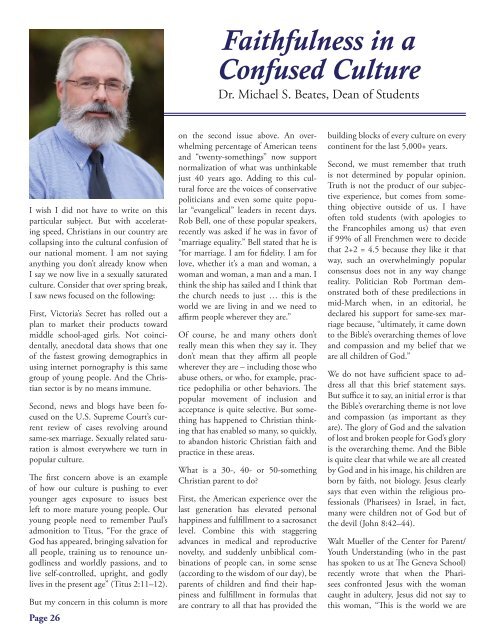April 12, 2013 - The Geneva School
April 12, 2013 - The Geneva School
April 12, 2013 - The Geneva School
Create successful ePaper yourself
Turn your PDF publications into a flip-book with our unique Google optimized e-Paper software.
Faithfulness in aConfused CultureDr. Michael S. Beates, Dean of StudentsI wish I did not have to write on thisparticular subject. But with acceleratingspeed, Christians in our country arecollapsing into the cultural confusion ofour national moment. I am not sayinganything you don’t already know whenI say we now live in a sexually saturatedculture. Consider that over spring break,I saw news focused on the following:First, Victoria’s Secret has rolled out aplan to market their products towardmiddle school-aged girls. Not coincidentally,anecdotal data shows that oneof the fastest growing demographics inusing internet pornography is this samegroup of young people. And the Christiansector is by no means immune.Second, news and blogs have been focusedon the U.S. Supreme Court’s currentreview of cases revolving aroundsame-sex marriage. Sexually related saturationis almost everywhere we turn inpopular culture.<strong>The</strong> first concern above is an exampleof how our culture is pushing to everyounger ages exposure to issues bestleft to more mature young people. Ouryoung people need to remember Paul’sadmonition to Titus, “For the grace ofGod has appeared, bringing salvation forall people, training us to renounce ungodlinessand worldly passions, and tolive self-controlled, upright, and godlylives in the present age” (Titus 2:11–<strong>12</strong>).But my concern in this column is morePage 26on the second issue above. An overwhelmingpercentage of American teensand “twenty-somethings” now supportnormalization of what was unthinkablejust 40 years ago. Adding to this culturalforce are the voices of conservativepoliticians and even some quite popular“evangelical” leaders in recent days.Rob Bell, one of these popular speakers,recently was asked if he was in favor of“marriage equality.” Bell stated that he is“for marriage. I am for fidelity. I am forlove, whether it’s a man and woman, awoman and woman, a man and a man. Ithink the ship has sailed and I think thatthe church needs to just … this is theworld we are living in and we need toaffirm people wherever they are.”Of course, he and many others don’treally mean this when they say it. <strong>The</strong>ydon’t mean that they affirm all peoplewherever they are – including those whoabuse others, or who, for example, practicepedophilia or other behaviors. <strong>The</strong>popular movement of inclusion andacceptance is quite selective. But somethinghas happened to Christian thinkingthat has enabled so many, so quickly,to abandon historic Christian faith andpractice in these areas.What is a 30-, 40- or 50-somethingChristian parent to do?First, the American experience over thelast generation has elevated personalhappiness and fulfillment to a sacrosanctlevel. Combine this with staggeringadvances in medical and reproductivenovelty, and suddenly unbiblical combinationsof people can, in some sense(according to the wisdom of our day), beparents of children and find their happinessand fulfillment in formulas thatare contrary to all that has provided thebuilding blocks of every culture on everycontinent for the last 5,000+ years.Second, we must remember that truthis not determined by popular opinion.Truth is not the product of our subjectiveexperience, but comes from somethingobjective outside of us. I haveoften told students (with apologies tothe Francophiles among us) that evenif 99% of all Frenchmen were to decidethat 2+2 = 4.5 because they like it thatway, such an overwhelmingly popularconsensus does not in any way changereality. Politician Rob Portman demonstratedboth of these predilections inmid-March when, in an editorial, hedeclared his support for same-sex marriagebecause, “ultimately, it came downto the Bible’s overarching themes of loveand compassion and my belief that weare all children of God.”We do not have sufficient space to addressall that this brief statement says.But suffice it to say, an initial error is thatthe Bible’s overarching theme is not loveand compassion (as important as theyare). <strong>The</strong> glory of God and the salvationof lost and broken people for God’s gloryis the overarching theme. And the Bibleis quite clear that while we are all createdby God and in his image, his children areborn by faith, not biology. Jesus clearlysays that even within the religious professionals(Pharisees) in Israel, in fact,many were children not of God but ofthe devil (John 8:42–44).Walt Mueller of the Center for Parent/Youth Understanding (who in the pasthas spoken to us at <strong>The</strong> <strong>Geneva</strong> <strong>School</strong>)recently wrote that when the Phariseesconfronted Jesus with the womancaught in adultery, Jesus did not say tothis woman, “This is the world we are






